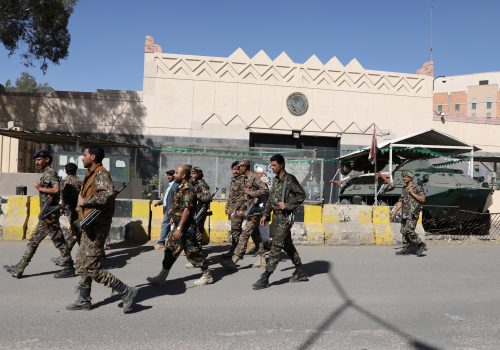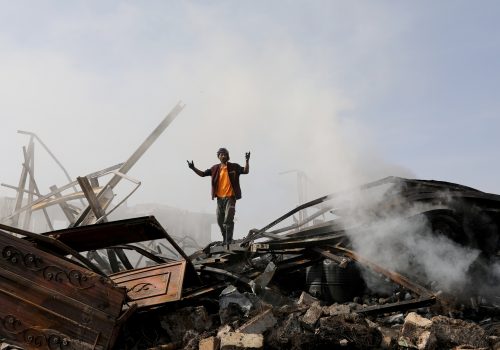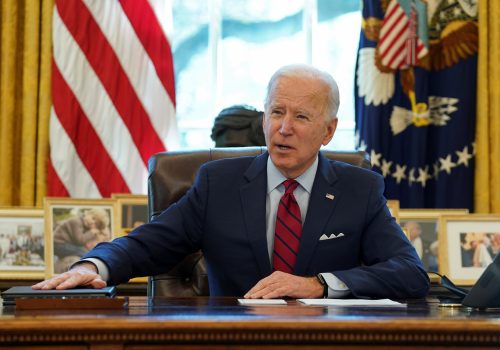Optimism mixed with realism about the Biden administration’s promises on Yemen
I was, admittedly, mistaken in my December 18, 2020 assertion regarding the top priorities of the first one hundred days of Joe Biden’s presidency—specifically that the Yemen catastrophe will not be among them. Although the Biden administration is facing many pressing domestic and international issues, multiple statements during the confirmation hearing of Secretary Tony Blinken and National Security Advisor Jake Sullivan expressed mounting interest in ending the war in Yemen and its regional impact.
To my pleasant surprise, the administration stepped up its efforts by emphatically stating that the war in Yemen “has to end,” as expressed by President Biden in his February 4 speech. Biden described it as a “war which has created a humanitarian and strategic catastrophe.” The situation is an unfolding disaster unprecedented in its scale and extent.
The appointment of Ambassador Tim Lenderking as US Special Envoy to Yemen is the right step towards streamlining United States’ efforts internally and externally with allies to end the war, address its humanitarian impact, and avert the looming famine.
Ambassador Lenderking’s mandate is within the framework of “America is back”—President Biden’s statement at the State Department on February 4. President Biden reaffirmed that American diplomacy has returned with its most cherished values of freedom, human rights, the rule of law, and respect for human dignity and opportunity.
Furthermore, the president stressed the US support for the United Nations (UN)-led initiative to impose a ceasefire, open humanitarian channels, restore long-dormant peace talks, and work with the UN envoy and all parties of the conflict to push for a diplomatic resolution.
For the first time in Yemen’s conflict, the US administration publicly presented its vision to end Yemen’s war. For many experts on the topic, myself included, Biden’s call presents a unique opportunity—one that the parties to the conflict and their allies must not miss after six years of war. This conflict is increasingly threatening to drag Yemen and the region down the path of permanent instability and distress.
The prolonged war in Yemen has made it clear that good intentions are not enough to change the harsh realities—the Hodeidah agreement is a vivid example of this. The United Nations Security Council (UNSC) tried to manage the Yemeni dilemma using many different approaches and, yet, failed to shoulder its responsibility to “maintain international peace and security” as mandated in the UN Charter. During the last six years, others have tried to derail the UN-led process, but President Biden insisted that US diplomacy will lead the UNSC’s efforts to end the war in Yemen.
It is fine to have good intentions to “end the war,” but good intentions are just a tiny start. They are far outweighed by the complications in the strategic implementation processes. One must only look next door to Somalia as an example of how challenging the peace process can be when a war economy and warlords drain a nation.
US diplomacy—through Ambassador Lenderking’s efforts in Yemen and US Special Envoy for Iran Rob Malley’s efforts in Iran—would channel international efforts to defuse the regional tensions between the Gulf Cooperation Council countries and Iran. Nevertheless, the two envoys need to streamline their efforts in order to not send wrong signals to the parties on the ground. Recent developments on the delisting of the Houthis rebels from the Foreign Terrorist Organization list were not the best place to start. Furthermore, I’m afraid that focusing on the Yemeni crisis’ regional side can drive Yemen into a low-intensity conflict and forgotten war. The parties involved on the ground are too narrowly focused on a zero-sum game approach to pursue complete victory and are not yet ready to engage in a political settlement—this is especially true for the Houthis.
For the last few years, Saudi Arabia has searched for viable alternatives to ensure that the end of the war would establish peace and security in its southern border and neighboring Yemen, keeping Iran out of what it considers its sphere of influence. All Saudi attempts to talk with the Houthis had been aborted because Tehran has the last word. Negotiating with drones and missiles attacks is the most refined negotiation skill of Iran’s proxies. Although Biden’s statement speaks to ending all American support for offensive operations in Yemen’s war—including relevant arms sales—it is important to note that Riyadh has made a huge contribution to breaking Iranian expansionism in the region, which is instrumental to the latest American peace efforts.
Ambassador Lenderking has no ready prescription—nor is there a quick fix to the crisis in Yemen. The complexities result from six years of war and four years of political transition from a dictatorship that lasted more than thirty-three years in power. Additionally, over the decades, Yemen has been engulfed in civil wars, coups, and tribal vendettas between the north and the south before the reunification of 1990. Last but not least, the steady and dangerous rise of the Houthis, who have been challenging state institutions in Yemen since 2003, have been another contributing factor. In my view, Ambassador Lenderking will try to manage the multilateral leverage on Yemen. A durable solution in the country will ultimately fall into the hands of the Yemeni people, who can either choose to end the war with the support of the international community or extend the carnage for another ten years.
It is worth noting that Ambassador Lenderking is not empowered to address all layers of the protracted crisis in Yemen that have accumulated during the last sixty years of its history, that would require miracles. The US envoy will have to focus on President Biden’s core mandate of ending the war in Yemen and the Special Envoy of the Secretary-General for Yemen Martin Griffiths’s “Joint Declaration”: a document thoroughly negotiated during the last ten months.
Taking a glance at the Yemeni puzzle, the Houthi warlords are expanding their fiefdoms through repression and iron fists. Meanwhile, the liberated areas are facing severe power fragmentations. Then there is the growing number of Yemeni actors on the ground that loosely control what once was 75 percent of the country: the forces of the Southern Transitional Council (STC) in Aden and the surroundings, the “Guardians of the Republic” on the west coast, other militias formation in Taiz, and the Yemeni government’s forces. It is vital to finish the Saudi-led coalition’s obligations to strengthen the government’s position, including integrating the forces of STC, the west coast, and other non-regular formations under the state’s military apparatus’ command and control.
Riyadh was Ambassador Lenderking’s first stop in the region on February 10, where he met the coalition and the government. This will be followed by meeting the Houthis in Masqat and permanent members of the UNSC in New York. This last stop should be the most crucial international move of the revived US-UN multilateralism, as it will allow the US to work with the permanent members to regain what was once a united and strong message on Yemen and the return of Russia’s important role, especially with Iran and the Houthis.
The road ahead is difficult—especially as it relates to the Houthis. They mistrust anything coming from the US, a country they curse daily in their slogans of war, as the master aggressor jointly with Israel and Saudi Arabia. For Ambassador Lenderking, it’s a challenging assignment that will take him through turbulent waters. Will the Biden administration deliver its promises in Yemen? Will the Pax Americana finally return some hope to the desperate souls of Yemenis? Two important questions that will determine the course of events in the next few years.
Ambassador Khaled H. Alyemany is the former Foreign Minister of Yemen.
Image: A boy stands with Houthi supporters at a ceremony held to send donated clothes to Houthi fighters at the frontlines against government forces, in Sanaa, Yemen November 24, 2020. REUTERS/Khaled Abdullah


